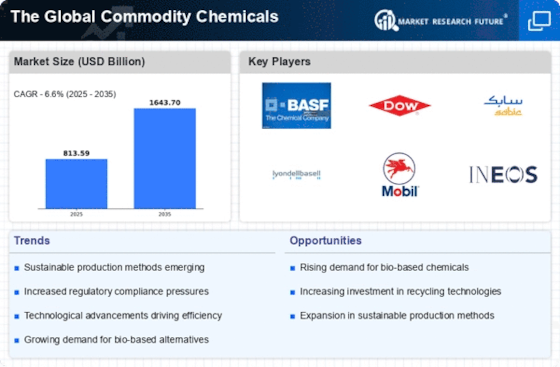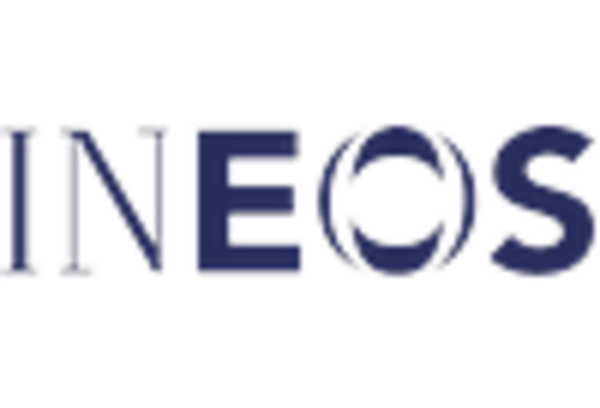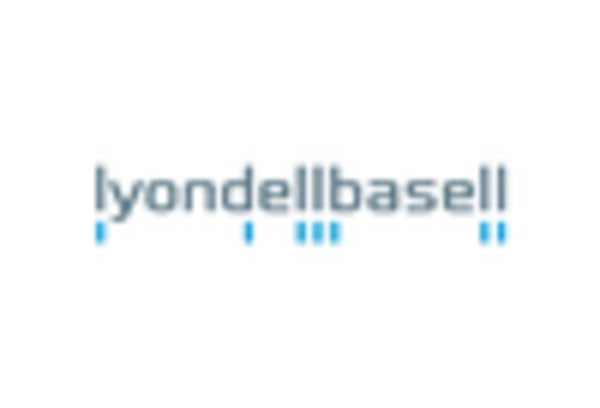-
EXECUTIVE SUMMARY
-
MARKET INTRODUCTION
-
Definition
-
Scope of the Study
- Research Objective
- Assumptions
- Limitations
-
RESEARCH METHODOLOGY
-
Overview
-
Data Mining
-
Secondary Research
-
Primary Research
- Primary Interviews and Information Gathering Process
- Breakdown of Primary Respondents
-
Forecasting Modality
-
Market Size Estimation
- Bottom-Up Approach
- Top-Down Approach
-
Data Triangulation
-
Validation
-
MARKET DYNAMICS
-
Overview
-
Drivers
-
Restraints
-
Opportunities
-
MARKET FACTOR ANALYSIS
-
Value Chain Analysis
-
Porter’s Five Forces Analysis
- Bargaining Power of Suppliers
- Bargaining Power of Buyers
- Threat of New Entrants
- Threat of Substitutes
- Intensity of Rivalry
-
COVID-19 Impact Analysis
- Market Impact Analysis
- Regional Impact
- Opportunity and Threat Analysis
-
Commodity Chemicals Market, BY PRODUCT
-
Overview
-
Ester
-
Ether
-
Amine
-
Alcohol
-
Aliphatic Hydrocarbon
-
Aromatic Hydrocarbon
-
Chlorinated Solvents
-
Ketones
-
Fatty Chemicals
-
Chelating Agents
-
Others
-
Commodity Chemicals Market, BY END-USE
-
Overview
-
Plastics & Rubber
-
Electronics & IT
-
Food & Beverages
-
Pharmaceuticals & Personal Care
-
Building & Construction
-
Automotive
-
Agriculture
-
Mining
-
Oil & Gas
-
Household Industrial and Institutional (HI & I)
-
Others
-
Commodity Chemicals Market, BY REGION
-
Overview
-
North America
- US
- Canada
-
Europe
- Germany
- France
- UK
- Italy
- Spain
- Rest of Europe
-
Asia-Pacific
- China
- India
- Japan
- South Korea
- Australia
- Rest of Asia-Pacific
-
Rest of the World
- Middle East
- Africa
- Latin America
-
COMPETITIVE LANDSCAPE
-
Overview
-
Competitive Analysis
-
Market Share Analysis
-
Major Growth Strategy in the Global Commodity Chemicals Market,
-
Competitive Benchmarking
-
Leading Players in Terms of Number of Developments in the Global Commodity Chemicals Market,
-
Key developments and Growth Strategies
- New Product Launch/Service Deployment
- Merger & Acquisitions
- Joint Ventures
-
Major Players Financial Matrix
- Sales & Operating Income, 2022
- Major Players R&D Expenditure. 2022
-
COMPANY PROFILES
-
BASF SE
- Company Overview
- Financial Overview
- Product Offered
- Key Developments
- SWOT Analysis
- Key Strategies
-
Bayer Group
- Company Overview
- Financial Overview
- Product Offered
- Key Developments
- SWOT Analysis
- Key Strategies
-
AkzoNobel N.V.
- Company Overview
- Financial Overview
- Product Offered
- Key Developments
- SWOT Analysis
- Key Strategies
-
The Dow Chemical Company
- Company Overview
- Financial Overview
- Product Offered
- Key Developments
- SWOT Analysis
- Key Strategies
-
LyondellBasell Industries Holdings B.V.
- Company Overview
- Financial Overview
- Product Offered
- Key Developments
- SWOT Analysis
- Key Strategies
-
E.I. DuPont de Nemours and Company
- Company Overview
- Financial Overview
- Product Offered
- Key Developments
- SWOT Analysis
- Key Strategies
-
Mitsui Chemicals
- Company Overview
- Financial Overview
- Product Offered
- Key Developments
- SWOT Analysis
- Key Strategies
-
Braskem SA
- Company Overview
- Financial Overview
- Product Offered
- Key Developments
- SWOT Analysis
- Key Strategies
-
PPG Industries
- Company Overview
- Financial Overview
- Product Offered
- Key Developments
- SWOT Analysis
- Key Strategies
-
Eastman Chemical Company
- Company Overview
- Financial Overview
- Product Offered
- Key Developments
- SWOT Analysis
- Key Strategies
-
APPENDIX
-
References
-
Related Reports
-
LIST OF TABLES
-
GLOBAL COMMODITY CHEMICALS MARKET, SYNOPSIS, 2025-2034
-
GLOBAL COMMODITY CHEMICALS MARKET, ESTIMATES & FORECAST, 2025-2034 (USD BILLION)
-
Commodity Chemicals Market, BY PRODUCT, 2025-2034 (USD BILLION)
-
Commodity Chemicals Market, BY END-USE, 2025-2034 (USD BILLION)
-
NORTH AMERICA: Commodity Chemicals Market, BY PRODUCT, 2025-2034 (USD BILLION)
-
NORTH AMERICA: Commodity Chemicals Market, BY END-USE, 2025-2034 (USD BILLION)
-
US: Commodity Chemicals Market, BY PRODUCT, 2025-2034 (USD BILLION)
-
US: Commodity Chemicals Market, BY END-USE, 2025-2034 (USD BILLION)
-
CANADA: Commodity Chemicals Market, BY PRODUCT, 2025-2034 (USD BILLION)
-
CANADA: Commodity Chemicals Market, BY END-USE, 2025-2034 (USD BILLION)
-
EUROPE: Commodity Chemicals Market, BY PRODUCT, 2025-2034 (USD BILLION)
-
EUROPE: Commodity Chemicals Market, BY END-USE, 2025-2034 (USD BILLION)
-
GERMANY: Commodity Chemicals Market, BY PRODUCT, 2025-2034 (USD BILLION)
-
GERMANY: Commodity Chemicals Market, BY END-USE, 2025-2034 (USD BILLION)
-
FRANCE: Commodity Chemicals Market, BY PRODUCT, 2025-2034 (USD BILLION)
-
FRANCE: Commodity Chemicals Market, BY END-USE, 2025-2034 (USD BILLION)
-
ITALY: Commodity Chemicals Market, BY PRODUCT, 2025-2034 (USD BILLION)
-
ITALY: Commodity Chemicals Market, BY END-USE, 2025-2034 (USD BILLION)
-
SPAIN: Commodity Chemicals Market, BY PRODUCT, 2025-2034 (USD BILLION)
-
SPAIN: Commodity Chemicals Market, BY END-USE, 2025-2034 (USD BILLION)
-
UK: Commodity Chemicals Market, BY PRODUCT, 2025-2034 (USD BILLION)
-
UK: Commodity Chemicals Market, BY END-USE, 2025-2034 (USD BILLION)
-
REST OF EUROPE: Commodity Chemicals Market, BY PRODUCT, 2025-2034 (USD BILLION)
-
REST OF EUROPE: Commodity Chemicals Market, BY END-USE, 2025-2034 (USD BILLION)
-
ASIA-PACIFIC: Commodity Chemicals Market, BY PRODUCT, 2025-2034 (USD BILLION)
-
ASIA-PACIFIC: Commodity Chemicals Market, BY END-USE, 2025-2034 (USD BILLION)
-
JAPAN: Commodity Chemicals Market, BY PRODUCT, 2025-2034 (USD BILLION)
-
JAPAN: Commodity Chemicals Market, BY END-USE, 2025-2034 (USD BILLION)
-
CHINA: Commodity Chemicals Market, BY PRODUCT, 2025-2034 (USD BILLION)
-
CHINA: Commodity Chemicals Market, BY END-USE, 2025-2034 (USD BILLION)
-
INDIA: Commodity Chemicals Market, BY PRODUCT, 2025-2034 (USD BILLION)
-
INDIA: Commodity Chemicals Market, BY END-USE, 2025-2034 (USD BILLION)
-
AUSTRALIA: Commodity Chemicals Market, BY PRODUCT, 2025-2034 (USD BILLION)
-
AUSTRALIA: Commodity Chemicals Market, BY END-USE, 2025-2034 (USD BILLION)
-
SOUTH KOREA: Commodity Chemicals Market, BY PRODUCT, 2025-2034 (USD BILLION)
-
SOUTH KOREA: Commodity Chemicals Market, BY END-USE, 2025-2034 (USD BILLION)
-
REST OF ASIA-PACIFIC: Commodity Chemicals Market, BY PRODUCT, 2025-2034 (USD BILLION)
-
REST OF ASIA-PACIFIC: Commodity Chemicals Market, BY END-USE, 2025-2034 (USD BILLION)
-
REST OF THE WORLD: Commodity Chemicals Market, BY PRODUCT, 2025-2034 (USD BILLION)
-
REST OF THE WORLD: Commodity Chemicals Market, BY END-USE, 2025-2034 (USD BILLION)
-
MIDDLE EAST: Commodity Chemicals Market, BY PRODUCT, 2025-2034 (USD BILLION)
-
MIDDLE EAST: Commodity Chemicals Market, BY END-USE, 2025-2034 (USD BILLION)
-
AFRICA: Commodity Chemicals Market, BY PRODUCT, 2025-2034 (USD BILLION)
-
AFRICA: Commodity Chemicals Market, BY END-USE, 2025-2034 (USD BILLION)
-
LATIN AMERICA: Commodity Chemicals Market, BY PRODUCT, 2025-2034 (USD BILLION)
-
LATIN AMERICA: Commodity Chemicals Market, BY END-USE, 2025-2034 (USD BILLION)
-
LIST OF FIGURES
-
RESEARCH PROCESS
-
MARKET STRUCTURE FOR THE GLOBAL COMMODITY CHEMICALS MARKET
-
MARKET DYNAMICS FOR THE GLOBAL COMMODITY CHEMICALS MARKET
-
GLOBAL COMMODITY CHEMICALS MARKET, SHARE (%), BY PRODUCT, 2021
-
GLOBAL COMMODITY CHEMICALS MARKET, SHARE (%), BY END-USE, 2021
-
GLOBAL COMMODITY CHEMICALS MARKET, SHARE (%), BY REGION, 2021
-
NORTH AMERICA: COMMODITY CHEMICALS MARKET, SHARE (%), BY REGION, 2021
-
EUROPE: COMMODITY CHEMICALS MARKET, SHARE (%), BY REGION, 2021
-
ASIA-PACIFIC: COMMODITY CHEMICALS MARKET, SHARE (%), BY REGION, 2021
-
REST OF THE WORLD: COMMODITY CHEMICALS MARKET, SHARE (%), BY REGION, 2021
-
GLOBAL COMMODITY CHEMICALS MARKET: COMPANY SHARE ANALYSIS, 2021 (%)
-
BASF SE: FINANCIAL OVERVIEW SNAPSHOT
-
BASF SE: SWOT ANALYSIS
-
BAYER GROUP: FINANCIAL OVERVIEW SNAPSHOT
-
BAYER GROUP: SWOT ANALYSIS
-
AKZONOBEL N.V.: FINANCIAL OVERVIEW SNAPSHOT
-
AKZONOBEL N.V.: SWOT ANALYSIS
-
THE DOW CHEMICAL COMPANY: FINANCIAL OVERVIEW SNAPSHOT
-
THE DOW CHEMICAL COMPANY: SWOT ANALYSIS
-
LYONDELLBASELL INDUSTRIES HOLDINGS B.V.: FINANCIAL OVERVIEW SNAPSHOT
-
LYONDELLBASELL INDUSTRIES HOLDINGS B.V.: SWOT ANALYSIS
-
E.I. DUPONT DE NEMOURS AND COMPANY: FINANCIAL OVERVIEW SNAPSHOT
-
E.I. DUPONT DE NEMOURS AND COMPANY: SWOT ANALYSIS
-
MITSUI CHEMICALS: FINANCIAL OVERVIEW SNAPSHOT
-
MITSUI CHEMICALS: SWOT ANALYSIS
-
BRASKEM SA: FINANCIAL OVERVIEW SNAPSHOT
-
BRASKEM SA: SWOT ANALYSIS
-
PPG INDUSTRIES: FINANCIAL OVERVIEW SNAPSHOT
-
PPG INDUSTRIES: SWOT ANALYSIS
-
EASTMAN CHEMICAL COMPANY: FINANCIAL OVERVIEW SNAPSHOT
-
EASTMAN CHEMICAL COMPANY: SWOT ANALYSIS



















Leave a Comment